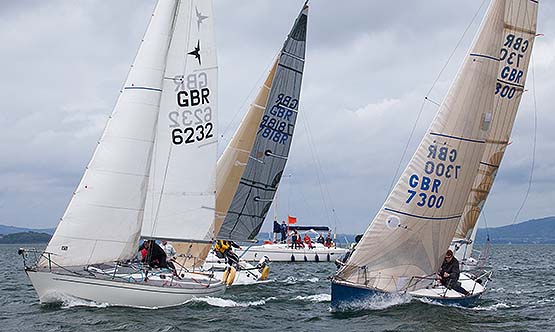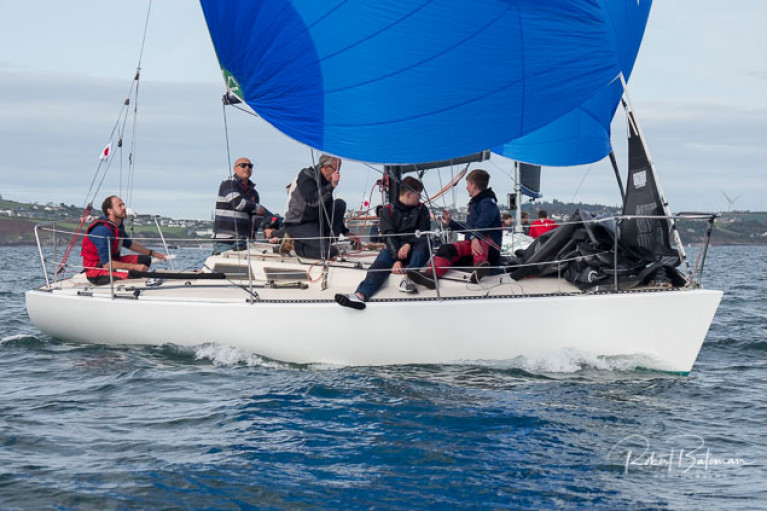Displaying items by tag: Autumn Series
Royal Cork Abandons Autumn Racing Today Due to Gales (UPDATED)
Sunday 9 am: Racing today in Royal Cork's AIB Autumn Series in Cork Harbour has been abandoned. 'N' over 'A' was hoisted on the club flagpole this morning indicating the second day of the series has fallen to strong winds. As Afloat reported earlier (see below) the club waited until this morning before making the final call, "We wanted to give it every chance but the breeze now looks to be coming in at midday", said RCYC's Alex Barry.
Saturday: 6 pm Although the shadow of a gale warning hangs over the second day of racing in Sunday's AIB Autumn Series in Cork Harbour, the Royal Cork Yacht Club organisers say this evening they eye 'a window' of opportunity to race and won't make any call until tomorrow morning.
The 1720s that raced separately for Munster Championships honours last weekend will join the Series tomorrow and further boost the 50-boat fleet for week two. The sportsboat class will start with Class 0 but have a separate set of results.
Forecasts show north-westerly gusts up to 45 mph at start time tomorrow morning.
 The XC Weather forecast for Crosshaven
The XC Weather forecast for Crosshaven
Dramatic Sailing for Conclusion of Belfast Lough Autumn Yachting Series
There was some dramatic sailing on the final day of the Belfast Lough Autumn Series. Whilst many of the first Class prizes in the series had already been decided, this didn't stop those behind trying their hardest to make a mark.

The IRC fleet got away first in a shifting southerly breeze. Whilst 15 knots and gusts of up to 25 knots were forecast, the wind eased just before the start and most started with full sail though stretched to their maximum. Both Indigo and Final Call clung to the back of Giggle as close as possible upwind. The wind backed at the end of each of the downwind legs forcing boats to drop their spinnakers and gybe at the leeward mark asking for perfect teamwork and coordination. Giggle was first to feel the pressure with some unusual spinnaker fleg flying and the halyard refusing to drop. Fifty foot of asymmetric is a bit of an anchor on the upwind leg and allowed Indigo to record their second win of the series followed by Final Call.
Ken Green has obviously been watching some of the Americas Cup manoeuvres in Bermuda and pulled a fantastic start in the Sigma fleet sailing underneath Cariad and Sqwawk to keep both high of the committee boat until just before the signal. Starshine Challenger the took advantage of some favourable lifts getting the first of any gusts and quickly built a comfortable lead. Sqwawk drew Cariad into a tacking duel and just squeezed past at the top mark though Cariad followed closely on the way back down and tried hard to drop their kite at the last minute to keep the pressure on. Unfortunately their spinnaker backed either side of their genoa making retrieval very slow and allowing Sqwawk to escape.
Mingulay and Margarita had another tight race in the CYCA class with the former getting away but being slowly dragged back by the finish to a dramatic final on elapsed time. Team Curry, Wilde and Nixey had their best race of the series, scoring second on corrected time, with Colonomas coming in fourth.
While Jonathan Star had already secured the NIRKRA prize, the series points were very close in the ranks below. The leaders built a good lead quickly followed by Alan Morrison's Starflash who had only the father/son team of John and Conor Simms to assist him but went on to score their best result of the series. They were followed closely by QtPi and Manzanita but it was David Quinn's Chatterbox just behind who scored the race win on handicap and with it, second place in the series.
The Belfast Lough Autumn Series has seen some of the best keelboat racing of the year with differing but manageable conditions throughout, unseasonable warm temperatures and great courses laid on by Race Officer Colin Loughead and his committee boat and mark laying team. All of the crews attended the overall prize giving at Ballyholme Yacht Club where BYC Commodore Mark Mackey and RUYC Vice Commodore Myles Lindsay gave many thanks to them and the Committee boat owners, in particular Elaine and David Taylor who stood in for all of the October races.
Overall Results
IRC
1. Giggle Phil Davis
2. Final Call J Minnis/ B Roche
Sigma
1. Sqwawk Paul Prentice
2. Starshine Challenger Burton Allen
CYCA
1. Mingulay. John & Mandy Ritchie
2. Margarita. John Moorehead
NIRKRA
1. Jonathan Star Garth, Kathryn and Myles Lindsay
2. Chatterbox. David Quinn
Waverley
1. Montrose Robin & Victoria Millar
2. Ivanhoe John McCrea




























































